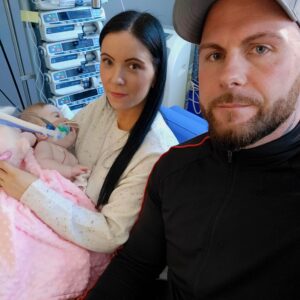The Brits “killed” Indi. Her father: “I’m angry, heartbroken and ashamned”
LONDON – Indi Gregory died in a cold English hospice where she had been transferred after the Queen’s Medical Center hospital in Nottingham stopped life support, as ruled by the English High Court against the advice of her parents. “She has an incurable disease and it is against her best interests to keep her alive”, British judges had ruled.
To keep alive the eight-month-old baby, suffering from a rare form of mitochondrial pathology, considered by doctors to be incurable, father Dean and mother Claire had tried everything and had found a solution in Italy: the Bambino Gesù hospital in Rome had offered to host her and last November 6th the government led by Giorgia Meloni had decided, in a flash-meeting that lasted a few minutes, to grant the little girl citizenship to allow her to be transferred to Rome, paying all expenses.
But, despite the long legal battle undertaken by the parents, last week the English High Court still ordered a stop to vital treatments and the transfer of the little girl to a hospice, where last night she died in the arms of her mother who until the end asked, together with her husband, to at least be able to take her baby home.
The little girl’s heart stopped beating at 1.45am on Monday: it was announced by her father Dean. “My daughter died, my life ended at 1.45am”, he said. “My wife Claire and I are angry, heartbroken and ashamed. The health service and the (English) courts have not only taken away her chance to live, but also the dignity of dying in her home. They managed to take the body and Indi’s dignity, but they can never take her soul. I knew she was special from the day she was born, they tried to leave her without anyone knowing, but Claire and I made sure she would be remembered for always” he told to LaPresse agency. And then the heartbreaking detail, reported by Indi’s father: “Claire kept her with her for her last breaths”.

Prime Minister Meloni expressed her condolences on social networks: “We did everything we could, everything possible. Unfortunately it wasn’t enough. Have a safe trip, little Indi”. Deputy Prime Minister Matteo Salvini also published a post dedicated to the little girl: “Little Indi Gregory is no longer here, a news that we would never have wanted to read. The Italian government has done its utmost, offering to treat her in our country, unfortunately without success. A touching prayer for her and a sincere hug to her parents”.
The Indi case has not been particularly divisive in Italy, even if there are also very active abortion and/or pro-euthanasia movements which, however, in this case have kept a very low profile, as demonstrated by the words of the secretary of +Europa, Riccardo Magi, who, while reiterating his political opposition to the Italian government’s initiative about Indi, underlined the opportunity not to fuel divisions on such a delicate topic. “Granting citizenship to little Indi Gregory was not a humanitarian act but a political act of the government which would not have guaranteed anything more than the care that the little girl has already received in England, in one of the best pediatric hospitals in the world – Magi said – . There was no medical consultation that was different from that expressed by the English doctors, the Bambino Gesù of Rome would have ensured only palliative care for this little girl. Among other things, also in Italy, based on the 2017 law, if there is an evaluation by the doctors that differs from that of the family members, a judge intervenes to evaluate the best interest for the patient, i.e. stopping at the point where life becomes absolute pain and only pain. I express the utmost closeness to the family for the bereavement, I believe not let this be the case on which we clash and divide ourselves”.
The dominant feelings in Italy following the death of Indi Gregory are anger and bewilderment. The lawyer Simone Pillon (in the pic below) – lawyer for the Gregory family, former senator of the right party Lega and anti-abortion and pro-life activist – published a post on social networks, writing: “#IndiGregory died tonight at 1.45am, killed by a system that did not allow her to be welcomed into Italy, and even prohibited her from dying at home. She died baptized and a martyr. Now from heaven she will intercede for all children like her. The parents are heartbroken and angry at what happened. The system wanted Indi’s body, but it will not have her soul, said the father. Let it be a warning to those who also want to introduce euthanasia rules in Italy. Life and death can never be decided by health bureaucrats or dusty courts. It’s simply not up to them”.
The comment from the “Pro Vita & Famiglia” movement on Twitter is very harsh. “The English little girl was killed by a healthcare and legal system steeped in a barbaric euthanasia culture, which refused to even attempt the different clinical proposal of the Bambino Gesù hospital in Rome, stifling the love of her parents in the courtrooms. Today we are all full of shame”, continues the movement: “We are ashamed of a ‘modernity’ which, out of ‘pity’, suppresses the weak and defenceless. Forgive us, Indi. Even in your name we will continue to fight to counter this crazy euthanasia drift. Help us from Heaven”.
“Strong bitterness and indignation” for the death of Indi Gregory is expressed by the Lombard regional councilor of Fratelli d’Italia, Giacomo Zamperini. “In England evil and human perfidy have prevailed, this time too. Not only men who should bring justice and care have snatched the life of a defenseless creature , but they did it against the will of her parents, without even allowing them to take her into their home”, underlines Zamperini, recalling that “Indi had become an Italian citizen in all respects, so now a clash of a diplomatic nature could also arise and legal issues between Italy and the United Kingdom”. The regional councilor of FdI announces that “if there were to be a trial in Italy, I will ask the Lombardy Region to constitute a civil party” against “a rule of law that plays God, decreeing on the life and death of people, choosing which lives which are worthy of being lived and which are not, taking the place of relatives and dearest loved ones in this decision”.
“It was doctors and judges who chose for this little girl’s life, without anyone listening to her parents’ wishes” comments Antonio Affinita, general director of Moige – Italian Parents’ Movement. “These poor parents, already heartbroken by the pain of seeing their daughter suffering from such an illness, have been denied an important and decisive aspect of parenting: choosing what is best for the good of their children. How is it possible that they have remained unheard? It is to be feared that a similar episode could also occur in Italy, especially in the event that the law on euthanasia is approved. The cold bureaucracy of governments cannot ‘steal children’ by replacing their parents and deciding on their death”.
The indignation is bi-partisan, as emerges from the few but very harsh words of Marco Rizzo, honorary president of the Italian Communist Party: “A resurgence of inhumanity affects children, in London as in Gaza”, the historic exponent of the Italian far left party wrote on Twitter.






